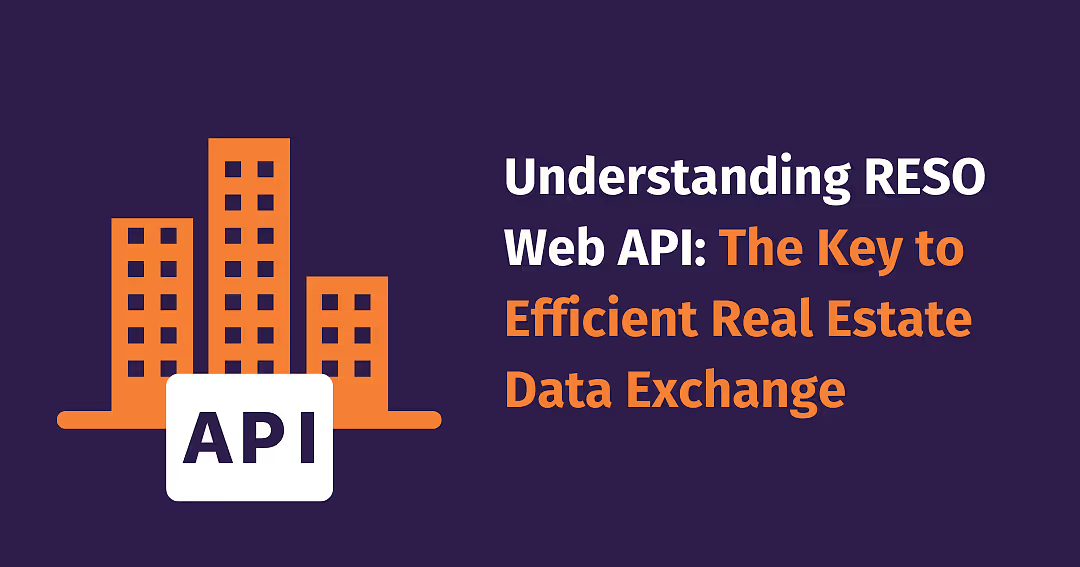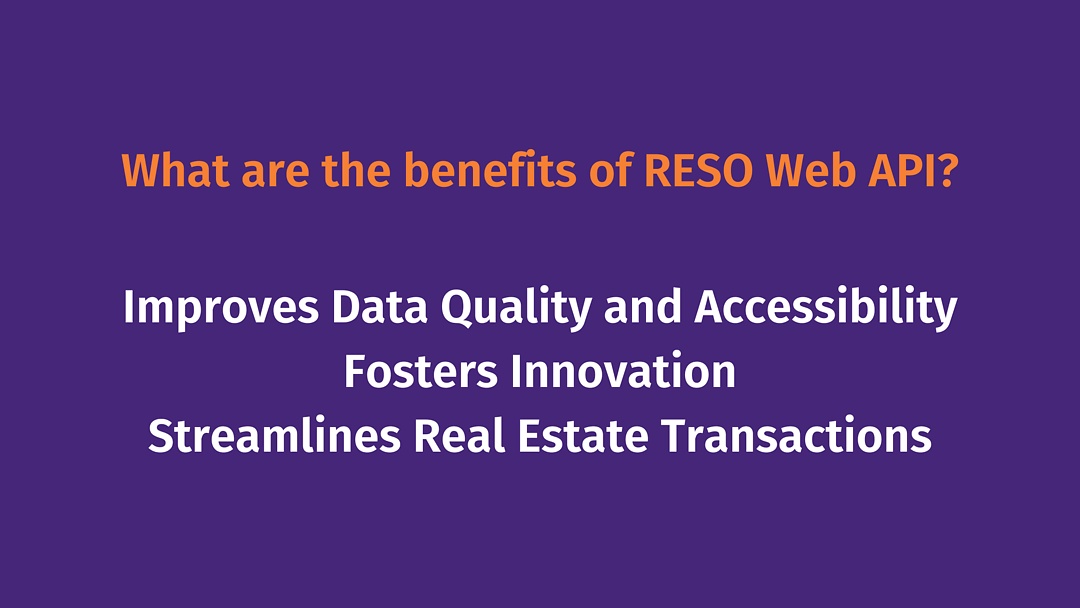Understanding RESO Web API: The Key to Efficient Real Estate Data Exchange


Cementing consistency in real estate transactions, RESO standards are essential for professionals aiming to navigate and succeed in a data-centric market.
This article brings you the tangible benefits and implementation processes that underpin industry-wide efficiency and compatibility.
Key Takeaways
- The RESO Web API is vital for the real estate industry; it improves real-time access to MLS databases, encourages adoption of standardized systems, and fosters innovation and efficiency in property searches and listings.
- The Real Estate Standards Organization (RESO) standards facilitate uniform data exchange across the real estate industry, notably improving efficiency and interoperability among various stakeholders such as MLSs, brokerages, and technology partners.
- The RESO Data Dictionary and Transport Standards are critical components, acting as a universal real estate language and enabling data transfer highways, thereby defining data structure and providing efficient retrieval of MLS data through consistent, standardized processes.
The Importance of RESO Standards in Real Estate Data Exchange
The real estate industry, a massive web of interconnected stakeholders, thrives on the smooth exchange of data. The RESO standards, developed by a national association, serve as the lifeline for this data exchange, ensuring uniformity and enhancing the overall efficiency of the industry. They ensure your real estate data remains organized and consistent, avoiding confusion amid the various data sources.
Moreover, RESO Analytics acts as the industry’s compass, providing valuable insights into the technical capabilities, utilization, and performance of large data providers, including market data. It's not a system that rates but rather provides direction and support to improve interoperability and efficiency for stakeholders like brokerages, MLSs, and technology partners.
Benefits of RESO Standards Adoption
Adopting RESO standards provides significant benefits and opportunities. It allows agents to utilize tools compatible across multiple MLSs and diverse geographic areas, significantly enhancing productivity. For technology partners, the standardized data formats provided by RESO are the keys to efficiently integrating and scaling their products in different markets.
The RESO certification offers a multitude of benefits, including:
- Establishing a trust level for data partners
- Ensuring a high standard of data quality
- Guaranteeing that brokers have the essential features for efficient operations
- Providing more economical hosting
- Improving data transfers
- Reducing coding requirements
- Easier third-party application integration
- Heightened security for MLS data
Key RESO Standards for Real Estate Professionals
In the wide-ranging real estate industry, RESO standards serve as markers that improve the sharing of information and collaboration among real estate professionals. Among these standards, two stand out for their vital role in shaping the industry - the RESO Data Dictionary and the RESO Transport Standards.
The RESO Data Dictionary is the universal language for real estate data, ensuring that different systems can communicate effortlessly. On the other hand, the RESO Web API plays the role of the bridge, allowing for efficient and standardized data retrieval, a crucial element for developing interoperable real estate technologies and platforms.
RESO Data Dictionary
Imagine a world where every real estate professional speaks the same language. No confusion, no misinterpretation – just seamless communication. That’s what the RESO Data Dictionary brings to the table. It serves as the universal language for real estate data, ensuring effortless communication between various systems.
By standardizing the structure and content of property listing data, the RESO Data Dictionary ensures consistency across the many MLS databases, simplifies integration for various tools, and contributes to the creation of more insightful property data. It defines fields and resources such as:
- ‘PropertyType Field’
- ‘ListingStatus Field’
- ‘Price Field’
- ‘Bedrooms Field’
- ‘Bathrooms Field’
The RESO Data Dictionary also allows for the establishment of custom fields to cater to unique local market situations while maintaining interoperability.
RESO Transport Standards
The RESO Transport Standards are the main routes for data movement in the real estate sector. They allow for the easy transfer of listing information between different apps, servers, and systems within the industry, ensuring that data can travel smoothly and efficiently.
A main objective of the RESO Transport Standards is to enable real-time retrieval of MLS data via standard search methods in the format designed in the RESO Data Dictionary. They provide a consistent approach for technology partners to follow across markets, while also allowing them to extend the standard with their own unique features.
The Role of RESO Web API
What the RESO Web API aims to achieve in the real estate industry? It standardizes data formatting and transmission, making information exchange as effortless as a walk in the park.
The RESO Web API is:
- The organizer of real estate data.
- Promoting standardization across different real estate systems
- Enabling compatibility and more seamless data sharing between MLSs, brokerages, and other real estate platforms.
Importance of RESO Web API
The RESO Web API significantly enhances real-time access to MLS databases, independent of websites and applications, in the real estate sector. It simplifies the data transfer process to IDX websites, addressing the limitations of the older RETS standard by negating the need for developers to individually copy and update MLS databases.
Leading MLSs are increasingly moving their customers to Web API services exclusively, encouraging businesses to use certified data systems to take full advantage of RESO standards and analytics. Indeed, the RESO Web API has emerged as the interface for application and server interactions.

Benefits of RESO Web API
The RESO Web API, a property details api, is a game-changer for the real estate industry and is considered one of the best real estate apis. By utilizing a real estate api like RESO, it improves the quality and accessibility of real estate data, making it easier for agents, brokers, and consumers to access up-to-date and consistent property information through a real estate website.
Furthermore, the adoption of the RESO Web API fosters innovation by allowing developers to create more versatile and user-friendly applications, contributing to the growth of the proptech sector. It also has a significant impact on enhancing real estate transactions, reducing errors, and enhancing efficiency in property searches and listings.
Implementing RESO Web API: A Step-by-Step Guide
Implementing the RESO Web API may seem like a daunting task, but it doesn’t have to be. Like building a house, it starts with laying a solid foundation. The first steps include obtaining access credentials, understanding the RESO Data Dictionary, and ensuring compliance with technical standards.
Once the foundation is laid, it’s time to build the structure. This involves:
- Setting up the RESO Web API
- Server configuration
- Authentication processes
- Setting up the environment for data exchange according to RESO standards.
The final steps involve:
- Mapping real estate data to the RESO Data Dictionary standards
- Integrating the API with existing systems
- Thoroughly testing the implementation for compliance with RESO standards.
Exploring Multi Listing Services (MLS): Foundations of Real Estate Networking
MLSs serve as a centralized database for property listings, facilitating collaboration among real estate professionals. They have a long history, having evolved from paper-based listings to digital platforms, and have had a significant impact on the real estate industry. With the help of multiple listing service, real estate professionals can easily access active listings, including commercial properties, enhancing their work process.
MLSs are equipped with several features and functions such as listing properties, sharing information among real estate agents and brokers, and enforcing data standards and ethical practices within the real estate community. However, like any city, MLS systems come with their own set of challenges like data accuracy, privacy concerns, and the integration of new technologies like the RESO Web API. One of the key aspects to consider is the quality and reliability of mls listing data.
Integrating RESO Web API with Multi Listing Services (MLS)
Integrating the RESO Web API with MLS systems combines the functionalities of both into a single, larger system. It offers benefits like improved data accuracy, real-time updates, and improved property listing and searching processes. However, there are technical aspects to consider, such as data synchronization, platform compatibility, and maintaining data privacy.
Despite these challenges, successful integration is achievable. It requires efficient data mapping, ensuring compliance with RESO standards, and leveraging support resources. These best practices simplify the integration process, resulting in a comprehensive and cohesive real estate data system with smooth data access.
Conclusion
As we navigate through the vast landscape of real estate data, the RESO Web API emerges as an essential tool for efficient real estate data exchange. It standardizes the language of data, making it easier for real estate stakeholders to communicate and collaborate. It’s like a universal translator, breaking down the barriers of disparate data formats and bringing everyone onto the same page.
The benefits it brings to the industry are immense, from improved data accuracy and accessibility to fostering innovation in real estate technology and improving real estate transactions. The RESO Web API is indeed paving the way for a more interconnected and efficient real estate industry.
Ready to scale your business with the right tech partner?
Related posts
Dive deeper into this topic with these related posts
You might also like
Discover more content from this category
Software as a Service (SaaS) provides the most extensive choice for business owners in the cloud market. Why? The site is easy to access - you only need an internet connection and a web browser.
The Curiosum way of greeting newly hired employees and keeping the employee lifecycle and workplace culture thriving.
Curiosum is a brainchild of two guys - Szymon and Michał. What made them leave their cozy corporate desks and put it all on the line to build their own software house? I sat down with them for a quick interview about their story and aspirations.






